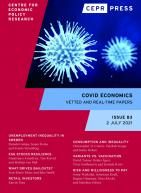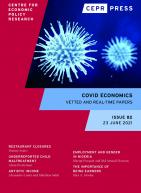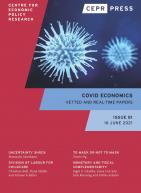
We present a comprehensive analysis of the performance and flows of U.S. actively managed equity mutual funds during the COVID-19 crisis of 2020. We find that most active funds underperform passive benchmarks during the crisis, contradicting a popular hypothesis. Funds with high sustainability ratings perform well, as do funds with high star ratings. Fund outflows largely extend pre-crisis trends. Investors favor funds that apply exclusion criteria and funds with high sustainability ratings, especially environmental ones. Our finding that investors remain focused on sustainability during this major crisis suggests they view sustainability as a necessity rather than a luxury good.
Citation
Vorsatz, B and L Pástor (2020), ‘Mutual Fund Performance and Flows During the COVID-19 Crisis‘, COVID Economics 38, CEPR Press, Paris & London. https://cepr.org/publications/covid-economics-issue-38#392514_392914_391046
Using survey responses across nearly 500 listed firms in 10 emerging markets from early April, we find the vast majority of firms were negatively affected by COVID-19. Firms reacted by reducing investment rather than payroll. There is a surprising degree of support vis-Ã -vis employees, customers, other stakeholders and broader society. Although stock prices initially reacted to the impact of the crisis, delayed stock price reactions suggest evidence of inefficient markets. Furthermore, we find evidence that stakeholder-centric firms experienced lower stock price declines during the crisis drawdown.
Citation
Flynn, B, M Homanen and T Beck (2020), ‘COVID-19 in emerging markets: firm-survey evidence‘, COVID Economics 38, CEPR Press, Paris & London. https://cepr.org/publications/covid-economics-issue-38#392514_392914_390565
I examine how financial markets interact with news about the COVID-19 pandemic. A twelve topic model optimizes the trade-off between number of topics and topic coherence. Using this model, I show that before mid-March 2020 markets react more to the same quantum of news when volatility is higher – a phenomenon I call hypersensitivity. Formal tests identify a structural break in mid-March, post which markets are no longer hypersensitive. In the hypersensitive stage, markets are overly volatile and overreact to news. Despite hypersensitivity, lagged prices better forecast future COVID-19 case counts than do lagged news.
Citation
Mamaysky, H (2020), ‘Financial Markets and News about the Coronavirus‘, COVID Economics 38, CEPR Press, Paris & London. https://cepr.org/publications/covid-economics-issue-38#392514_392914_391047
Using individual, race-disaggregated, and georeferenced death data collected by the Cook County Medical Examiner, we look at the impact of COVID-19 on African Americans and at its determinants. First, we provide evidence that - as of June 16, 2020 - blacks in Cook County are dying from COVID-19 at a rate 1.3 times higher than their population share. Second, by combining the spatial distribution of mortality with the redlining maps for the Chicago area, we establish that - after the epidemic outbreak - historically lower-graded neighborhoods display a sharper increase in mortality, driven by blacks. Thus, we uncover a persistence influence of the racial segregation induced by the lending practices of the 1930s, by way of a diminished resilience of African Americans to the COVID-19 shock. Such influence is channeled through socioeconomic status and household composition, and magnified in combination with a higher black share.
Citation
Dimico, A and G Bertocchi (2020), ‘COVID-19, Race, and Redlining‘, COVID Economics 38, CEPR Press, Paris & London. https://cepr.org/publications/covid-economics-issue-38#392514_392914_391048
Covid-19 and the measures taken to contain it have led to unprecedented constraints on work and leisure activities, across the world. This paper uses nationally representative surveys to document how people of different ages and incomes have been affected across six countries (China, South Korea, Japan, Italy, UK and US). We first document changes in economic variables (income and consumption) and leisure. Second, we document self-reported negative and positive non-financial effects of the crisis. We then examine attitudes towards recommendations (wearing a mask in particular) and the approach taken by public authorities. We find similarities across countries in how people of different generations have been affected. Young people have experienced more drastic changes to their lives, and overall they are less supportive of these measures. These patterns are less clear across income groups: while some countries have managed to shield lower income individuals from negative consequences, others have not. We also show that how people have been affected by the crisis (positively or negatively) does little to explain whether or not they support measures implemented by the public authorities. Young people are overall less supportive of such measures independently of how they have been affected.
Citation
Van den Broek-Altenburg, E, E Tripodi, N Papageorge, J Jamison, S Choi and M Belot (2020), ‘Unequal Consequences of Covid 19 across Age and Income: Representative Evidence from Six Countries‘, COVID Economics 38, CEPR Press, Paris & London. https://cepr.org/publications/covid-economics-issue-38#392514_392914_391049
We analyze the universe of point-of-sale (POS) transactions before and during the COVID-19 lockdown in Mexico. We find three key results. First, consumption in Mexico fell by 23 percent in the April-June quarter of 2020. Second, reductions in consumption were highly heterogeneous across sectors and states, with states and activities related to tourism the most affected. Third, using variation over time and states, we estimate the elasticity of POS expenditures with respect to geographic mobility (measured using cellphone location data) to be slightly less than 1. This estimate suggests that spending in developing countries may be more responsive to mobility than in developed countries, and that mobility indicators could be used as a real-time proxy for consumption in some economies.
Citation
Hernandez, G and R Campos-Vazquez (2020), ‘Consumption and Geographic Mobility in Pandemic Times. Evidence from Mexico‘, COVID Economics 38, CEPR Press, Paris & London. https://cepr.org/publications/covid-economics-issue-38#392514_392914_390566


Covid Economics - Issue 82
- Restaurant Closures during the Pandemic: A Descriptive Analysis
- Underreporting Child Maltreatment during the Pandemic: Evidence from Colorado
- Covid-19 impact on Artistic Income
- COVID-19, Employment, and Gender: Evidence from Nigeria
- The Importance of Being Earners: Modelling the Implications of Changes to Welfare Contributions on Macroeconomic Recovery
